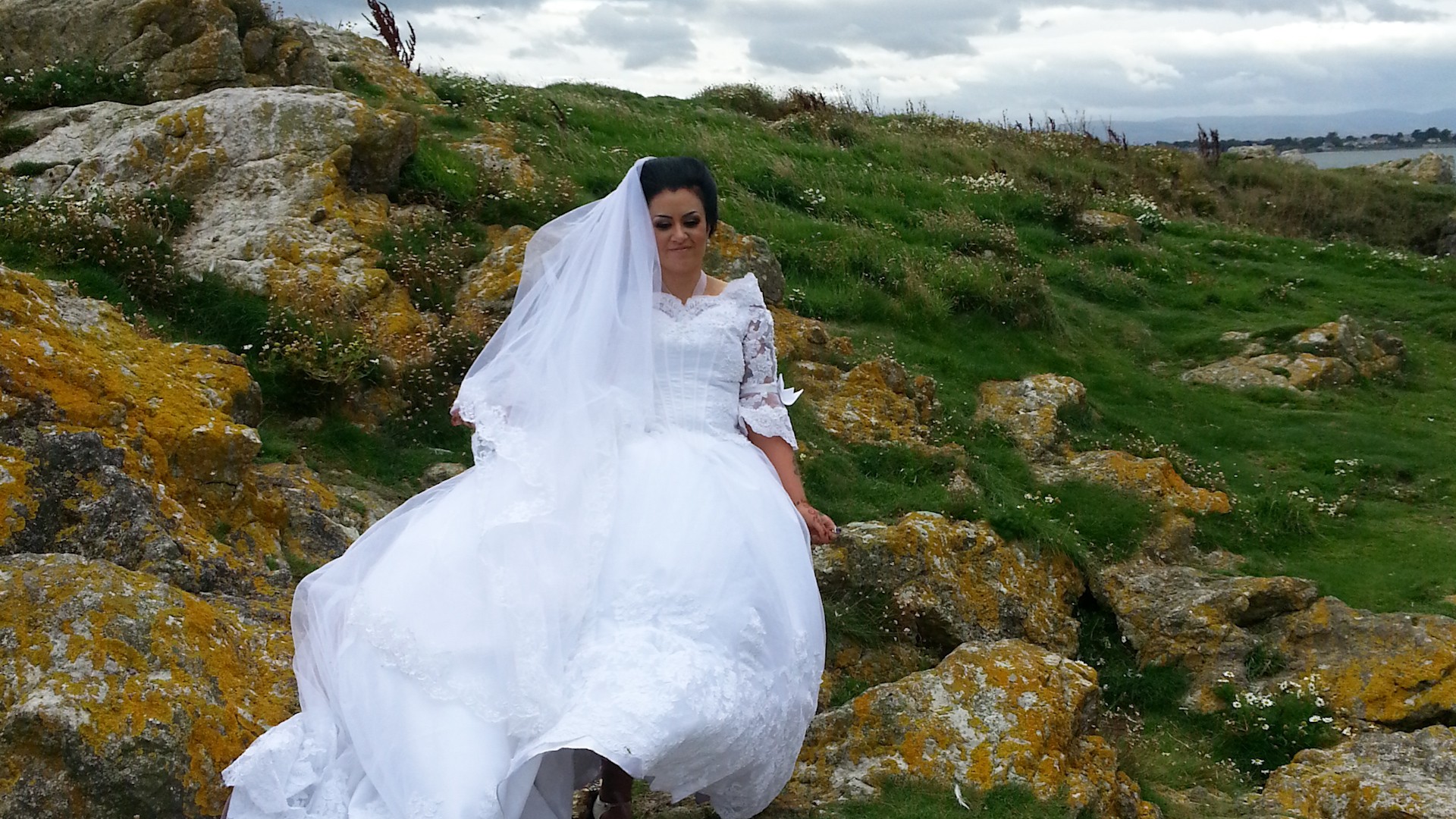This article originally appeared on VICE GermanyAnna Homann is a freelance midwife who works out of a clinic in Berlin's Neuköln district. Over the past decade, she's helped deliver around 50 babies and offered care and advice to new mothers in the first eight weeks after childbirth.She describes the job of a midwife as being a mix of social worker, nurse and psychologist. I spoke to Anna to find out how disgusting childbirth really is, what a placenta smoothie tastes like and why some fathers should never be allowed in the birthing room.
Advertisement
VICE: What's the most disgusting thing you've ever witnessed during childbirth?
Anna: As a midwife, you have to be prepared for anything to go down – and back up – during childbirth. Some women vomit a few times, while others get diarrhoea. The diarrhoea happens because a woman's uterus and bowels contract at the same time. All of this normally takes place at the start of labour and then again at the end, when the child comes through the birth canal and everything is pushed out with it. Finally, there's massive blood loss – around 400ml – due to the loss of the placenta and amniotic fluid. Despite everything I've seen, I still don't find births disgusting at all – I think they're beautiful.How many mothers have offered you a piece of their placenta?
None. But I did purée a small slice of my own with frozen berries and coconut milk to drink as a smoothie. The placenta didn't really taste of anything, but I didn't drink it for that – I did it because I heard it could contain certain properties that can protect new mothers from postpartum depression and help counteract the high blood loss. I have no idea if it's true, but I figured it couldn't hurt to try it out.How horrible is a perineum tear?
When the child's head comes out, a woman's perineum – the area between the vulva and anus – is rolled out as thin as parchment paper, and that's when the tension is really high and it can tear. But it's only until well after childbirth, when the skin has been cared for and sewn back together, that it starts to hurt.
Anna: As a midwife, you have to be prepared for anything to go down – and back up – during childbirth. Some women vomit a few times, while others get diarrhoea. The diarrhoea happens because a woman's uterus and bowels contract at the same time. All of this normally takes place at the start of labour and then again at the end, when the child comes through the birth canal and everything is pushed out with it. Finally, there's massive blood loss – around 400ml – due to the loss of the placenta and amniotic fluid. Despite everything I've seen, I still don't find births disgusting at all – I think they're beautiful.How many mothers have offered you a piece of their placenta?
None. But I did purée a small slice of my own with frozen berries and coconut milk to drink as a smoothie. The placenta didn't really taste of anything, but I didn't drink it for that – I did it because I heard it could contain certain properties that can protect new mothers from postpartum depression and help counteract the high blood loss. I have no idea if it's true, but I figured it couldn't hurt to try it out.How horrible is a perineum tear?
When the child's head comes out, a woman's perineum – the area between the vulva and anus – is rolled out as thin as parchment paper, and that's when the tension is really high and it can tear. But it's only until well after childbirth, when the skin has been cared for and sewn back together, that it starts to hurt.
Advertisement
Some of Anna's equipment in her office in Berlin
Does the vagina stay stretched out after giving birth?
Yes, unless you train the muscles to tighten up again. But the younger you are, the quicker your body recovers. Also, women who are physically fit often have faster births and suffer less complications.Do you recommend fathers watch the birth?
It depends on the type of guy the father is. There are those who question everything the midwife says and does, and are generally overprotective, but caring. Then you get the complete opposite, with fathers who seem a bit disinterested. I've seen men spend the entire time looking at their watch, seemingly annoyed by how long it's all taking. Those sort of fathers don't even bother to put a reassuring hand on their wife’s shoulder. Finally, some guys just don't want to be there for the main event, so they leave the room until after their child is born. Obviously it's down to each individual couple to decide what they want. Sometimes, when I'm in the wave of emotion, I’ll shout "look!" at the father to get him to see what's happening.Do you ever get parents who seem to regret having a child moments after childbirth?
I've personally not experienced that yet. But things can get difficult when the mother is in so much pain; the father almost feels guilty – to the point where he can't bear to hold the newborn.
WATCH:
What sort of couples shouldn't have kids?
Sometimes child services will send me to check on troubled parents, and often their apartments are filthy and their newborns are not eating what they should be. On one occasion, I had to call the authorities myself because I could see that a disabled child wasn't being properly cared for.How do couples react when they find out that their child has a disability?
I don't have much experience with this, because kids with severe disabilities are more likely to be birthed by a doctor than by a midwife. But I did have a couple once who were told, five months into the pregnancy, that their child had Down syndrome. That discovery meant the parents didn't want the child anymore. When the infant was born critically premature, they refused to spend any time with the newborn before the child died. How do you cope with a stillborn child?
How do you cope with a stillborn child?
It can be very difficult. But the worst is when a pregnancy is already far advanced and the child dies in the womb. It's very hard to comfort the parents when that happens. I try to work with the couples in the months afterwards to make sure that they look after their physical and mental health, and assure them that they can talk to me anytime.What is the most common mistake new parents make in their relationships?
Many couples find it hard to share the workload, and immediately adopt the classic gender roles, where the man goes straight back to work and the woman is left feeling frustrated that she has to do everything at home. One client told me, five weeks after giving birth, that all she really wanted to do was go to the pub and smoke a cigarette. I could completely understand why she missed her freedom, but I try to be strict with new mothers and encourage them to just keep going and take everything day by day.
Yes, unless you train the muscles to tighten up again. But the younger you are, the quicker your body recovers. Also, women who are physically fit often have faster births and suffer less complications.Do you recommend fathers watch the birth?
It depends on the type of guy the father is. There are those who question everything the midwife says and does, and are generally overprotective, but caring. Then you get the complete opposite, with fathers who seem a bit disinterested. I've seen men spend the entire time looking at their watch, seemingly annoyed by how long it's all taking. Those sort of fathers don't even bother to put a reassuring hand on their wife’s shoulder. Finally, some guys just don't want to be there for the main event, so they leave the room until after their child is born. Obviously it's down to each individual couple to decide what they want. Sometimes, when I'm in the wave of emotion, I’ll shout "look!" at the father to get him to see what's happening.Do you ever get parents who seem to regret having a child moments after childbirth?
I've personally not experienced that yet. But things can get difficult when the mother is in so much pain; the father almost feels guilty – to the point where he can't bear to hold the newborn.
WATCH:

What sort of couples shouldn't have kids?
Sometimes child services will send me to check on troubled parents, and often their apartments are filthy and their newborns are not eating what they should be. On one occasion, I had to call the authorities myself because I could see that a disabled child wasn't being properly cared for.How do couples react when they find out that their child has a disability?
I don't have much experience with this, because kids with severe disabilities are more likely to be birthed by a doctor than by a midwife. But I did have a couple once who were told, five months into the pregnancy, that their child had Down syndrome. That discovery meant the parents didn't want the child anymore. When the infant was born critically premature, they refused to spend any time with the newborn before the child died.

It can be very difficult. But the worst is when a pregnancy is already far advanced and the child dies in the womb. It's very hard to comfort the parents when that happens. I try to work with the couples in the months afterwards to make sure that they look after their physical and mental health, and assure them that they can talk to me anytime.What is the most common mistake new parents make in their relationships?
Many couples find it hard to share the workload, and immediately adopt the classic gender roles, where the man goes straight back to work and the woman is left feeling frustrated that she has to do everything at home. One client told me, five weeks after giving birth, that all she really wanted to do was go to the pub and smoke a cigarette. I could completely understand why she missed her freedom, but I try to be strict with new mothers and encourage them to just keep going and take everything day by day.
